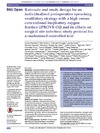Identificador persistente para citar o vincular este elemento:
https://accedacris.ulpgc.es/jspui/handle/10553/70878
| Título: | Rationale and study design for an individualised perioperative open-lung ventilatory strategy with a high versus conventional inspiratory oxygen fraction (iPROVE-O2) and its effects on surgical site infection: Study protocol for a randomised controlled trial | Autores/as: | Ferrando, Carlos Soro, Marina Unzueta, Carmen Canet, Jaume Tusman, Gerardo Suarez-Sipmann, Fernando Librero, Julian Peiró, Salvador Pozo, Natividad Delgado, Carlos Ibáñez, Maite Aldecoa, César Garutti, Ignacio Pestaña, David Rodríguez Pérez, Aurelio Eduardo García Del Valle, Santiago Diaz-Cambronero, Oscar Balust, Jaume Redondo, Francisco Javier De La Matta, Manuel Gallego, Lucía Granell, Manuel Martínez, Pascual Perez, Ana Leal, Sonsoles Alday, Kike García, Pablo Monedero, Pablo González, Rafael Mazzinari, Guido Aguilar, Gerardo Villar, Jesús Belda, Francisco Javier |
Clasificación UNESCO: | 3207 Patología | Fecha de publicación: | 2017 | Publicación seriada: | BMJ Open | Resumen: | Introduction Surgical site infection (SSI) is a serious postoperative complication that increases morbidity and healthcare costs. SSIs tend to increase as the partial pressure of tissue oxygen decreases: previous trials have focused on trying to reduce them by comparing high versus conventional inspiratory oxygen fractions (FIO 2) in the perioperative period but did not use a protocolised ventilatory strategy. The open-lung ventilatory approach restores functional lung volume and improves gas exchange, and therefore it may increase the partial pressure of tissue oxygen for a given FIO 2. The trial presented here aims to compare the efficacy of high versus conventional FIO 2 in reducing the overall incidence of SSIs in patients by implementing a protocolised and individualised global approach to perioperative open-lung ventilation. Methods and analysis This is a comparative, prospective, multicentre, randomised and controlled two-Arm trial that will include 756 patients scheduled for abdominal surgery. The patients will be randomised into two groups: (1) a high FIO 2 group (80% oxygen; FIO 2 of 0.80) and (2) a conventional FIO 2 group (30% oxygen; FIO 2 of 0.30). Each group will be assessed intra-and postoperatively. The primary outcome is the appearance of postoperative SSI complications. Secondary outcomes are the appearance of systemic and pulmonary complications. Ethics and dissemination The iPROVE-O2 trial has been approved by the Ethics Review Board at the reference centre (the Hospital Clínico Universitario in Valencia). Informed consent will be obtained from all patients before their participation. If the approach using high FIO 2 during individualised open-lung ventilation decreases SSIs, use of this method will become standard practice for patients scheduled for future abdominal surgery. Publication of the results is anticipated in early 2019. Trial registration number NCT02776046; Pre-results. | URI: | https://accedacris.ulpgc.es/handle/10553/70878 | ISSN: | 2044-6055 | DOI: | 10.1136/bmjopen-2017-016765 | Fuente: | BMJ Open [ISSN 2044-6055], v. 7 (7), e016765 |
| Colección: | Artículos |
Citas SCOPUSTM
10
actualizado el 08-jun-2025
Citas de WEB OF SCIENCETM
Citations
10
actualizado el 15-feb-2026
Visitas
253
actualizado el 15-ene-2026
Descargas
186
actualizado el 15-ene-2026
Google ScholarTM
Verifica
Altmetric
Comparte
Exporta metadatos
Los elementos en ULPGC accedaCRIS están protegidos por derechos de autor con todos los derechos reservados, a menos que se indique lo contrario.
